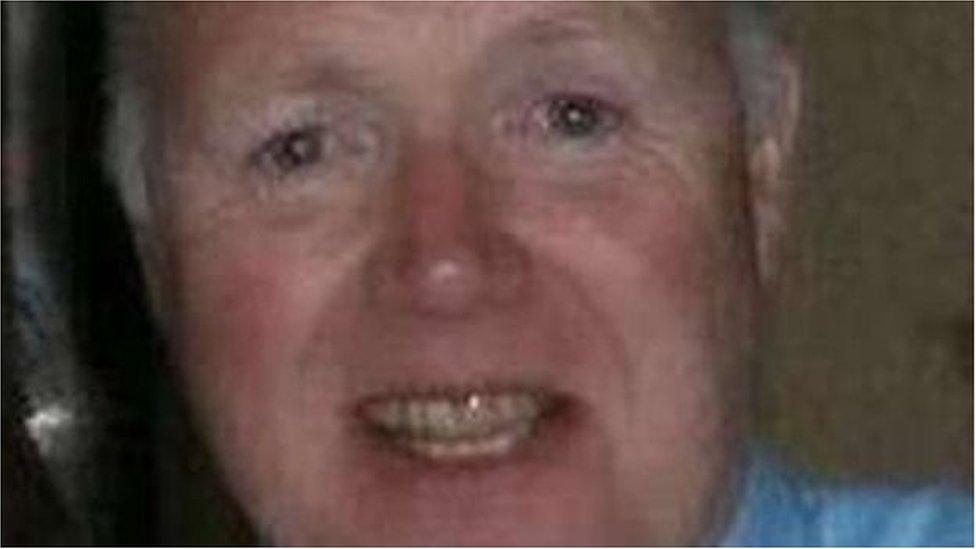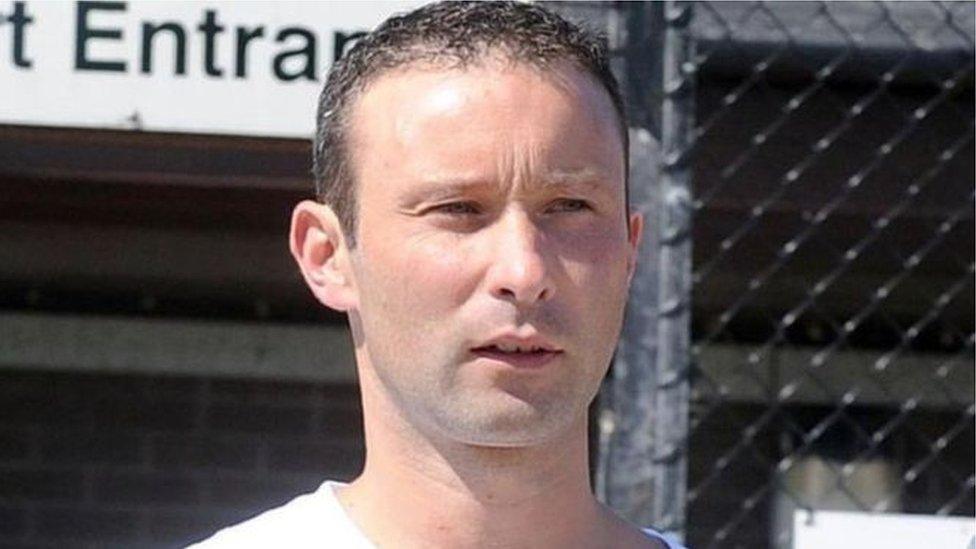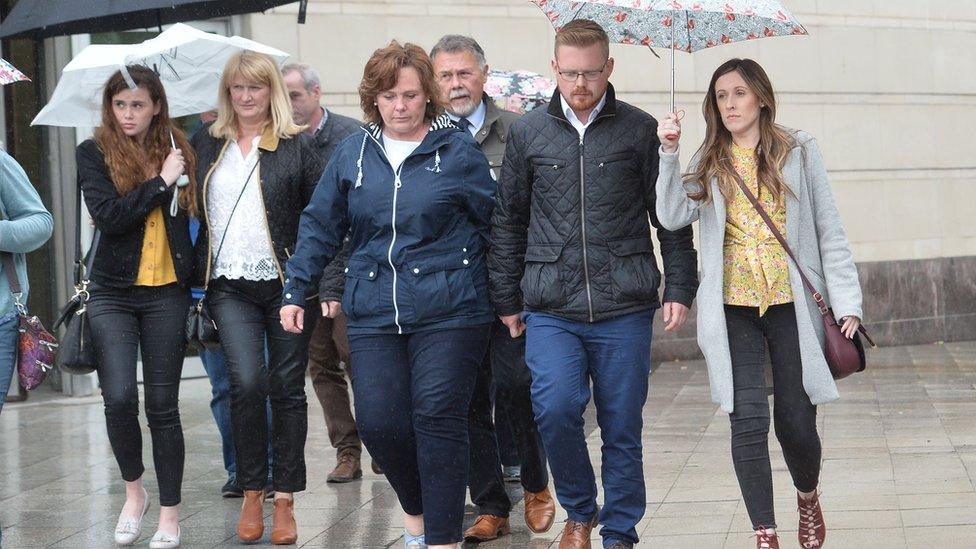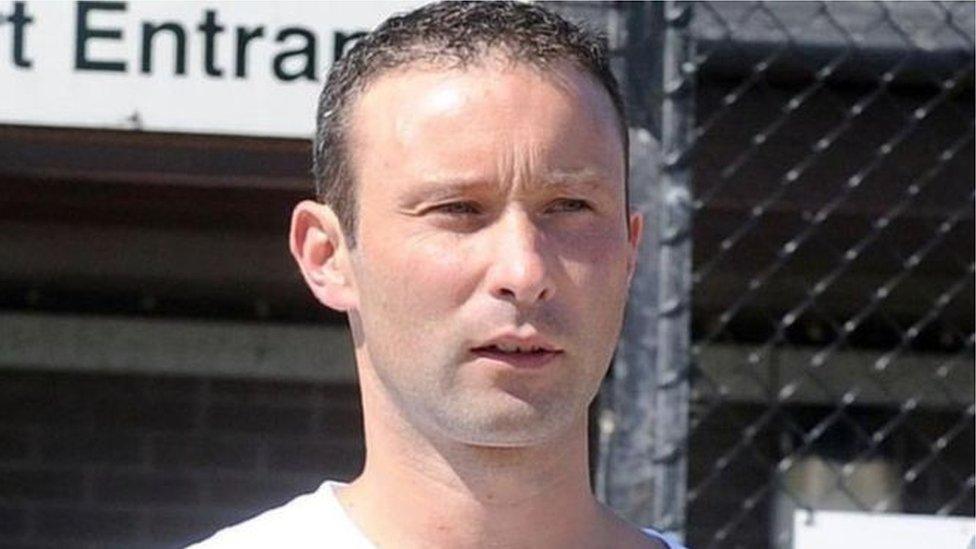David Black killing: Judge says 'unsafe' to convict accused
- Published

David Black was shot dead as he drove to work at Maghaberry prison in November 2012
The trial over the death of David Black could collapse on Thursday.
Mr Justice Colton today ruled it would be both unsafe and unreliable to convict Damien McLaughlin, 41, from County Tyrone, of the father-of-two's killing on 1 November 2012.
The Public Prosecution Service has been given until Thursday to decide whether to challenge the decision to throw out the case.
Mr McLaughlin denies involvement in the drive-by shooting.
The prosecution's case against Mr McLaughlin, from Kilmascally Road near Ardboe, rested "solely" on the evidence of County Leitrim man Stephen Brady, interviewed by specialist Irish police officers from Dublin in the wake of the "horrific shooting".
During the interviews, which the judge described as "oppressive, aggressive, hectoring and bullying", Mr Brady allegedly identified Mr McLaughlin as the man who moved the Toyota Camry car, which it is claimed was later used by the gunmen to carry out their ambush.
However on Tuesday, Mr Justice Colton said that having read and viewed the video-taped interviews, including evidence of the three police officers who conducted them, he "could not believe that it was contemplated that the interviews with Brady would be relied upon in any criminal prosecution".

Damien McLaughlin is charged with aiding and abetting the murder of David Black
Earlier he commented that, "the court was not impressed with the conduct and manner of these interviews".
Mr Justice Colton said the court was "not naive" about the nature of such interviews.
He said they were "not meant to be friendly conversations over a cup of tea", and that the use of "profane and oppressive language, however unnecessary or unjustified, does not in itself preclude" them as evidence.
However, the Belfast Crown Court judge said that one of the garda detectives involved "was correct when he accepted he did not ever envisage that the contents of the interviews would be scrutinised in a court of law and that he understood why a court would have concerns about the contents of the interviews."
Mr Justice Colton added that he had formed the impression "the true purpose of the interviews was to seek information from Brady other than obtain evidence for the purposes of a criminal prosecution".
'Unfair and unsafe'
In conclusion, the judge outlined five main points as to why Mr Brady's interview statements could not be cited as evidence and why the prosecution case, even taken at its height, should fail.
He said he was "not satisfied it would be in the interests of justice" to admit Mr Brady's hearsay evidence due to the "particular circumstances in which it was obtained."
Mr Justice Colton even went further in declaring not only should it not be admitted but also "that a trial depending on it should not be allowed to proceed because any conviction based on that evidence would be unsafe".
He added that given the "high and obvious risk of unreliability" of the statements, in his view it would be "unfair and unsafe for the defendant to be convicted on the basis of such evidence".

The Black family was in court to hear the case
In conclusion, Mr Justice Colton said that the evidence provided in Mr Brady's statements was "so unconvincing that considering its importance to the case against the defendant I would acquit the defendant on the grounds that his conviction for the offences would be unsafe".
He said Mr Brady's interviews could not have been used in a criminal prosecution against himself.
"It seems to me inconceivable that they would be admitted against the defendant McLaughlin," he added.
He said Mr Brady's was "the sole and decisive evidence in the case" and that there is "no other evidence" purporting to link the defendant to the Toyota vehicle used in the murder of Mr Black.
Attendance
The trial judge said that the prosecution had also failed to take all possible steps to ensure Mr Brady's attendance in court. They could have applied to the High Court in Dublin for him to give evidence there, or arranged for a live link to enable him to give evidence outside the Republic.
Mr Justice Colton said given the circumstances of the alleged offences, it would also have been open to the prosecution to have taken their case to the courts in the Republic "and this would not have caused any undue cost or delay".
At the end of the ruling, which took almost three hours to deliver, a prosecuting QC said given its complexity and length, he would ask for time to consider it, and decide whether to apply to the court directly or to the Court of Appeal, to challenge its findings.
It was agreed that the parties would return to court on Thursday morning.
- Published23 May 2018

- Published12 November 2012
.jpg)